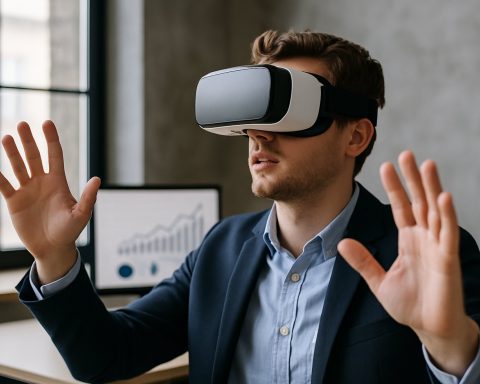- The global landscape is shifting with quantum technology poised to redefine computing and telecommunications by 2025.
- In the U.S., DARPA’s Quantum Benchmarking Initiative and potential legislation could significantly boost funding and development for quantum advancements.
- The EU is advancing its strategic autonomy with the EuroHPC Joint Undertaking, integrating quantum computers into its network.
- Switzerland implements export controls for quantum technologies to safeguard innovation, impacting delivery timelines for Asian partners.
- UK investments strengthen the National Quantum Computing Centre, laying groundwork with new testbeds for future breakthroughs.
- Australia’s Quantum Australia Conference showcases rapid advancement from research to tangible outcomes.
- Qatar hosts Quantum.Tech to bolster its position in the quantum field.
- Japan aligns with AUKUS for quantum navigation development with Australia and the UK.
- South Korea’s boosted budget and Quantum Frontier Strategy Council aim for quantum infrastructure excellence.
- China’s $55 billion science funding, including $7.2 billion for photonic quantum computing, signals growth in quantum dominance.
- India’s National Quantum Mission is setting up a “Quantum Valley” in Pune, marking progress in quantum key distribution.
Imagine a network of countries, each propelling itself into the future using the mysterious power of quantum technology. As 2025 unfolds, these breakthroughs promise to redefine global standards of computing and telecommunications, thrusting the world into an era of unprecedented technological revolution.
In the United States, momentum sweeps through the field as the Department of Defense’s Advanced Research Projects Agency (DARPA) pushes boundaries with the Quantum Benchmarking Initiative. Companies like Microsoft and PsiQuantum are sprinting towards developing quantum computers that can outpace classical computing capabilities by 2033. Meanwhile, the Robust Quantum Sensors project is reshaping defense strategies to withstand environmental chaos, waiting on Congress’s decisive Quantum Leadership Act to potentially inject a whopping $2.5 billion into the research cauldron.
Across the Atlantic, the European Union lays down a grandiose Quantum Strategy and Act, fondly awaited by the horizon of 2025. Through its EuroHPC Joint Undertaking, Europe has already sewn four quantum computers into its technological fabric, confidently advancing its strategic autonomy.
Tucked in their serene yet tech-savvy enclave, Switzerland now guards its quantum advancements with newly minted export controls on critical quantum technologies. These protective measures aim to ensure safe passage of innovations, albeit at the cost of longer delivery timelines for its Asian partners.
On the British front, £30 million has fortified the National Quantum Computing Centre with seven new testbeds—the groundwork for future breakthroughs in bridging theory to tangible applications. As these testbeds teem with potential, anticipation builds for upcoming revelations via the Quantum Research Hubs.
Turning the lens towards the Southern Hemisphere, Australia continues to dazzle. As the Quantum Australia Conference forges bonds across thirteen nations, it showcases how quantum science is accelerating from scholarly research to palpable applications, thanks in part to their Centre of Excellence.
Amid the desert sands, Qatar strides into the quantum limelight, hosting the Quantum.Tech conference. This pivotal gathering serves as a precursor to regional enthusiasm and innovation, highlighting the Gulf state’s growing stature in the quantum arena.
Japan, a confluence of tradition and modernity, approaches quantum development with diplomatic finesse. The nation participates in the AUKUS alliance as an advisor, channeling efforts into sophisticated quantum navigation technologies through pivotal partnerships, notably alongside Australian and UK academia.
Not to be overshadowed, South Korea’s Quantum Frontier Strategy Council, headed by the Prime Minister, has fired the starting pistol on a race for domestic quantum excellence, swelling the budget by 54% to expand its quantum infrastructure.
In China, a strategic injection of $55 billion in science funding, with a notable $7.2B earmarked for photonic quantum computing, signals an audacious leap towards dominance. Deployments like the superconducting Zuchongzhi 3.2 and the photonic Jiuzhang 3 raise the stakes in this technology-fueled epic.
Finally, India proudly persists with its National Quantum Mission, laying the foundation of a new “Quantum Valley” in Pune while making strides with quantum key distribution and prototype collaborations with Tata Institute.
In this kaleidoscope of ambition and innovation, the world’s major players are locked in a dynamic dance. Each nation, from the Americas to Asia, is crafting its own narrative in this unfolding quantum saga, setting the stage for a global technological renaissance. The race is not just for supremacy, but for a transformative leap into the very fabric of computational possibilities—a leap that promises to reshape our digital destiny.
How Quantum Technology is Driving a Global Tech Revolution
Introduction
The global race for quantum technology supremacy is rapidly intensifying as nations vie for leadership in this cutting-edge domain. Quantum computing and related technologies promise to revolutionize industries from computing to telecommunications by providing unprecedented capabilities.
Quantum Developments Around the Globe
United States:
The U.S. is heavily investing in quantum advancements through the Department of Defense’s Advanced Research Projects Agency (DARPA) and initiatives like the Quantum Benchmarking Initiative. With a possible $2.5 billion injection through the Quantum Leadership Act, companies such as Microsoft and PsiQuantum aim to develop quantum computers that outpace classical ones by 2033.
Europe:
The European Union is implementing a comprehensive Quantum Strategy through the EuroHPC Joint Undertaking, integrating four quantum computers to enhance its strategic autonomy. The union’s focus on collaboration across member nations is vital for maintaining a competitive edge in quantum technology.
Switzerland:
Switzerland has introduced export controls on critical quantum technologies to safeguard its innovations. This move may slow delivery times to Asian partners but aims to secure the nation’s technological investments.
United Kingdom:
The UK is boosting its quantum capabilities with a £30 million investment in the National Quantum Computing Centre, establishing seven new testbeds for future breakthroughs. These efforts are expected to enhance the practical applications of quantum research through its Quantum Research Hubs.
Australia:
Home to the Quantum Australia Conference, the nation showcases its role in advancing quantum science from academic research to practical applications, bolstered by its Centre of Excellence.
Qatar:
By hosting the Quantum.Tech conference, Qatar demonstrates its ambition to be a player in the quantum tech space, striving to foster regional innovation and collaboration.
Japan:
Japan balances tradition with modernity, contributing to quantum development through strategic alliances in the AUKUS partnership and focusing on advanced quantum navigation technologies.
South Korea:
South Korea’s Quantum Frontier Strategy Council leads the national push for quantum excellence, significantly increasing budgets to boost domestic quantum infrastructure.
China:
With a massive $55 billion investment in science funding, China is aggressively pursuing quantum supremacy. Key projects like the superconducting Zuchongzhi 3.2 and the photonic Jiuzhang 3 highlight China’s bold ambitions.
India:
India’s National Quantum Mission is making headway with quantum key distribution and prototype collaborations and the development of a “Quantum Valley” in Pune.
Key Insights and Future Trends
– Security and Quantum Cryptography: As quantum computing advances, the implications for cybersecurity are profound. Quantum cryptography promises to enhance secure communications, but it also poses threats to current encryption standards.
– Industry Applications: Quantum technology is poised to transform fields like pharmaceuticals, finance, logistics, and artificial intelligence. For example, quantum simulations could revolutionize drug discovery by allowing precise molecular modeling.
– Market Forecasts: The global quantum computing market is projected to grow significantly. According to some studies, the market could reach $65 billion by 2030, driven by increased investment, technological advancements, and application expansion.
Actionable Recommendations
1. Stay Informed: Keep abreast of the latest developments in quantum technology by following leading publications and conferences such as the Quantum.Tech conference and industry reports.
2. Explore Education: Consider enrolling in courses or certifications related to quantum computing and quantum information science to stay competitive in this burgeoning field.
3. Evaluate Risks: Businesses should assess potential security impacts and opportunities offered by quantum computing, preparing for the eventual integration of quantum-secure protocols.
4. Invest Wisely: Companies should explore potential investments in quantum technology for future-proofing and innovation leverage.
For more information and updates on quantum technology, visit IBM and Microsoft.
Conclusion
The race for quantum supremacy is more than a pursuit for technological dominance—it’s a transformative leap into the fabric of future possibilities that promise to reshape how we interact with technology and each other globally. Embracing these changes will require strategic foresight and continuous adaptability.









